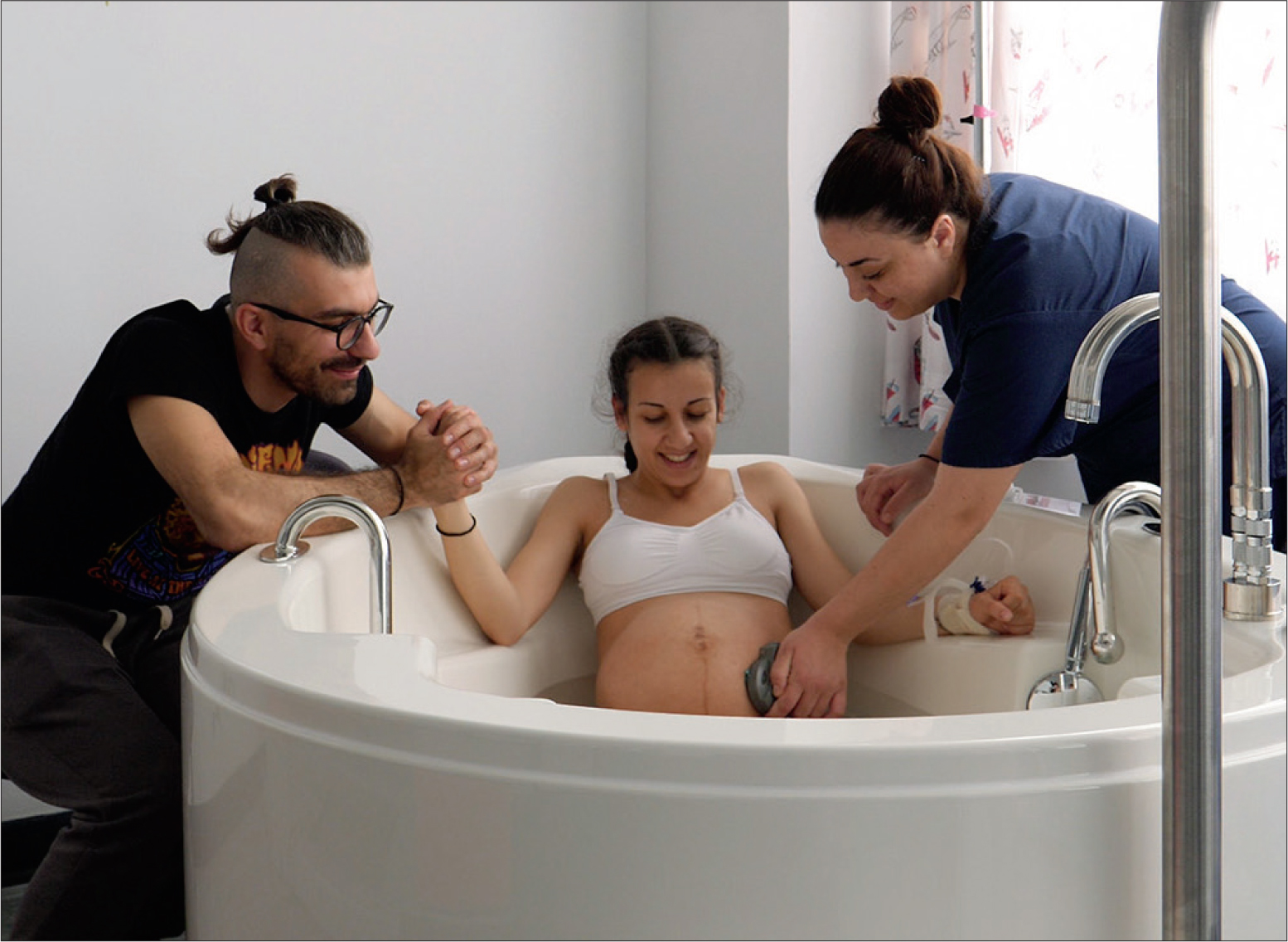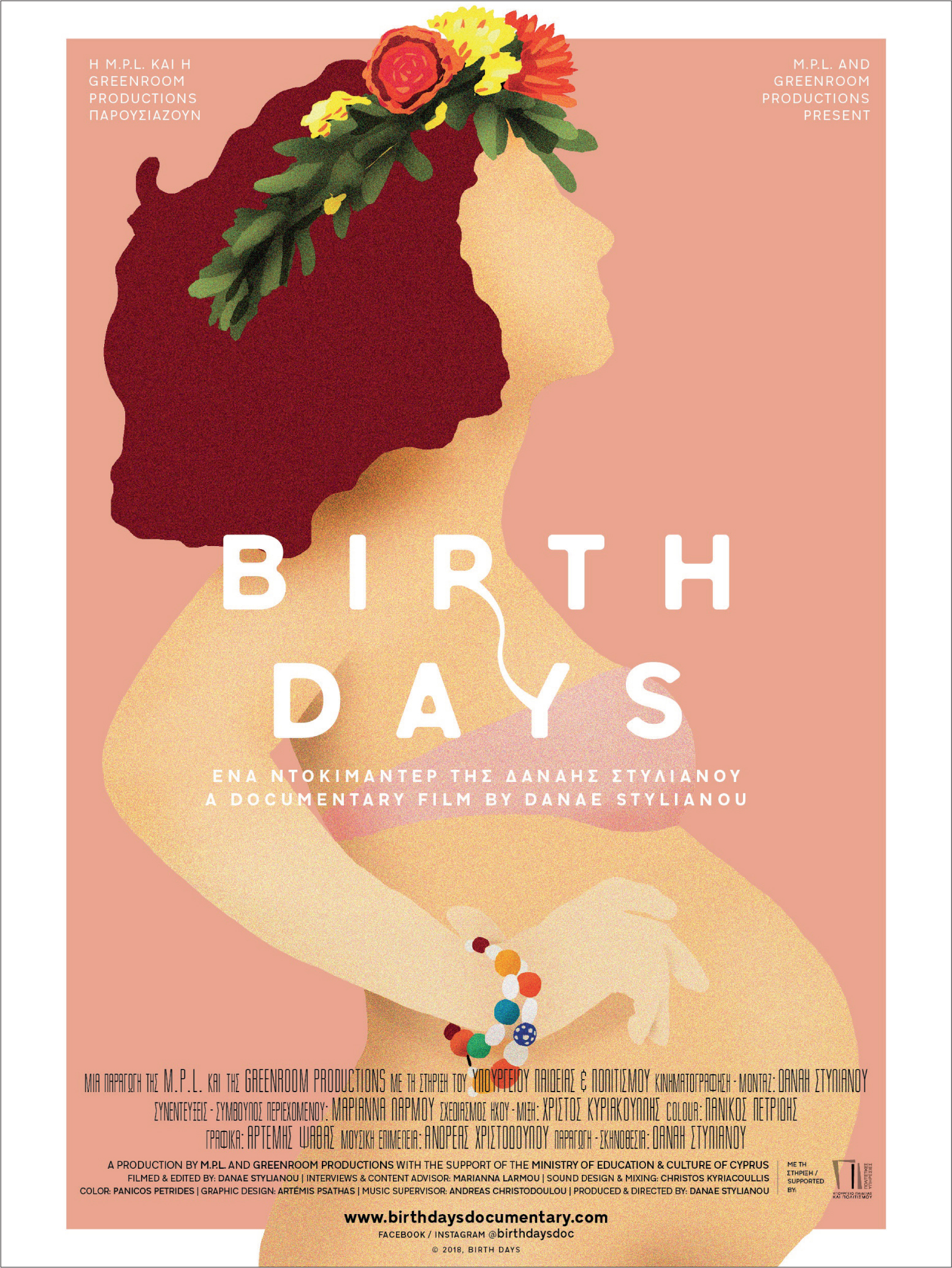A woman appears on screen; she cries deeply. A friendly hand appears on screen, caresses the naked back of the woman, then her face. A midwife tries to comfort a woman in labour. The pregnant woman and the midwife are on the floor, exercising to help dilation. This is the moment she has been waiting for. The protagonist, Ioli, has gone through a traumatic first birth via caesarean section (c-section); one that she considered medically unjustified and forced upon. This time around she has decided to go for a vaginal birth after caesarean (VBAC).
The documentary, by Danae Stylianou, follows the story of a mother who sets out to pursue a natural birth after c-section, and records her journey to reclaim her body and regain trust in the maternity care system. In Cyprus, c-section account for four times (Health Monitoring Unit, 2018) the recommended World Health Organization ([WHO], 1985) rate, often leaving women with little to no choice for natural labour. Right to privacy, respect for the body and the spontaneous initiation of labour, the option to request or refuse medical intervention and analgesia; all these rights still need to be fought for.
What is the role of midwives in protecting women's rights at childbirth? When I started making this documentary, I knew little about the holistic role of a midwife; not only in labour but also in protecting a woman's soul both during pregnancy and postpartum. My acquaintance with a number of Cypriot midwives got me interested in exploring this mother-like figure. I was fascinated by their patience, commitment and gentle practices. Amidst medical definitions, artificial painkillers, and fast-developing scientific disciplines, the presence of midwives seemed key to a positive experience of natural labour.

Almost all births in modern societies have been transferred to medical environments. Midwives are key to bridging this gap and enabling a natural hospital birth. In many countries, like Cyprus, the maternity care system is not midwife-centred and this adds to the increase in medical interventions. Only in public hospitals is the maternity unit run exclusively by midwives. Childbirth is a normal physiological process that can be accomplished without complications for the majority of women and babies. However, a substantial proportion of healthy pregnant women undergo at least one clinical intervention during labour and birth. They are also often subjected to needless and potentially harmful routine interventions. On the contrary, in countries where the system is midwife-centred, the occasions of unnecessary interventions seem to be much lower. C-sections are life-saving but are they always being performed solely in emergency situations?
A record number of babies in Cyprus – more than half – are born via c-section. Cyprus ranks first in Europe in c-sections with a striking 56.9% (Health Monitoring Unit, 2018). The WHO (1985) considers the ideal rate for c-sections to be between 10-15%. This fact alone got me interested in researching the matter.
In the documentary, the scenes are raw but beautiful. There is beauty but there is also pain. The audience can see that a woman can be mobile at labour; she has the right to be moving, exercising, dancing, eating if she wants to and not lie down as if she is sick. Always with a midwife by her side for practical and emotional support. Wanting to give birth naturally often seems not enough. Having an experienced midwife along the way, allows for a sense of control for the couple, through involvement in decision-making.
‘Birth Days’ brings forward a philosophy about the management of pain and the capability of the human body to endure that pain. As a filmmaker, I wanted to go deeper, and explore how we, as humans, accept our pains and agonies, overcome our fears and find ways to endure them. To me, childbirth is a raw representation of how we emotionally and physically experience and overcome our pains in life. I became witness to the miracle of life with my camera a few times. Just like birth, this film had to be made with a one-woman crew. Being the camera and sound operator gave me unprecedented access to the fascinating event of labour and birth. Raw images and emotion stand out of the real scenes that were filmed. The labours are filmed in a ‘verite’ style, with non-intrusive filming.
In this documentary, I try to find answers to complex questions as I believe that women have a fundamental right to informed choices at birth. My goal is to contribute in changing c-section mentality by advocating through the audiovisual medium. In the age of radical progress in image representation and the social media, the dominant cultural views representing birth as a terrifying experience have been reinforced. I believe it is time to change this by creating new, more powerful visual messages that will speak directly to the heart.

About the filmmaker
Danae Stylianou is a Cypriot producer and director. After studying film production (BA Hons) in the UK, she went on to direct various shorts and three documentary feature films which screened at various international film festivals: ‘Sharing An Island’ (2011), ‘A Haircut Story’ (2014) and ‘Birth Days’ (2018). Her latest documentary is a film about women's rights to informed choices at childbirth. Her work in general focuses on socio-political issues which concern the global citizen, and aims to raise social awareness. In 2019, in collaboration with Cyprus University of Technology, and funded by Erasmus+ ‘Adult Education’, Danae created audiovisual content for Baby Buddy Forward—an educational platform featuring short videos addressing parents-to-be and new parents.


